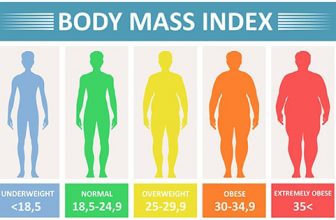
You know that feeling when you drop a few pounds and suddenly—somehow—you feel taller? You’re not imagining it. I’ve heard this idea tossed around for years: “Can losing weight actually make you taller?” And hey, I get why people believe it. When your jeans fit better and your posture improves, it’s easy to think your spine magically stretched overnight.
But here’s the thing—there’s a big difference between looking taller and growing taller. And most folks blur that line without even realizing it.
In this article, you’re going to unpack it all. From how fat distribution affects your frame to what posture, muscle mass, BMI, and even your spine’s compression say about your true height. Let’s get into how your body composition might be fooling your eyes—and what’s really going on underneath the surface.
Why People Think Losing Weight Makes You Taller
You’ve probably seen those dramatic before-and-after photos online—you know the ones. Someone sheds 30 pounds and suddenly looks like they gained two inches in height. And I’ll admit, I’ve looked at those pictures and thought the same thing: Did they actually grow? But here’s the deal—it’s less about bones stretching and more about how your body appears when certain things shift.
In my experience, this myth sticks around for a few solid (and kinda sneaky) reasons:
- Visual perception plays tricks on you. A slimmer silhouette often creates longer lines. When your waistline shrinks and your clothes fit better, your legs and torso look elongated—even if nothing’s changed structurally.
- Camera angles and posture improvements matter more than you think. After losing weight, people tend to stand straighter, shoulders back, chin up. Combine that with a good photo angle (I’ve done the same thing for profile pics), and boom—you “grew.”
- The American fitness culture glorifies tall and lean. In the U.S., especially, there’s this baked-in belief that “taller” equals “healthier” or “more attractive.” So when you lose fat and feel better, your brain connects the dots—even if your height didn’t budge.
- Social comparison kicks in hard. You see someone’s transformation and can’t help but measure your own body in the mirror. That can seriously mess with your self-perception, especially if you’re chasing a visual ideal that’s part illusion.

Weight Loss and Posture – A Real Connection
Now, here’s something I didn’t expect when I dropped my first 15 pounds: my posture changed—a lot. Not just in how I stood, but in how I moved, sat, even how my lower back felt at the end of the day. What I’ve found (and what research actually backs up) is that losing weight can genuinely shift your spinal alignment and the way your muscles work together.
Here’s why that matters if you’re chasing the illusion—or even the feeling—of added height:
- Less abdominal fat = better spinal support. When your belly shrinks, your core doesn’t have to constantly fight forward pull. Your lumbar spine gets more natural support.
- Improved muscle balance helps you stand taller. Especially if you’ve been strengthening your core and back during your weight loss. (If you’re not doing that, seriously—start.)
- Tighter alignment creates a longer silhouette. You’re not taller in inches, but the change in posture makes your spine stack properly. That “compressed” look? Gone.
- More flexibility = less hunching. Shedding extra weight often makes movement easier. I didn’t realize how stiff I’d become until I could twist and stretch without resistance.
In my experience, posture is where weight loss has the biggest visual impact on height. It’s not magic—it’s mechanics. But honestly, that upright, confident look? It reads as tall, strong, and grounded. And that’s worth chasing.
Spinal Compression and Decompression
You wake up a little taller than you go to bed. Sounds weird, right? But you’ve probably noticed it without realizing. In my experience, that daily height swing is where weight and the spine quietly connect. All day long, gravity presses down on your vertebrae, squeezing the intervertebral discs like slow-moving sponges.
Here’s what I’ve learned after years of watching bodies change—mine included:
- Extra weight increases spinal pressure. More load means your discs compress harder under gravitational pull. By evening, disc height shrinks a bit, and you feel it as stiffness or back pain.
- Fat doesn’t touch bone, but it amplifies force. You’re not crushing your spine directly, yet excess body mass increases compression through body mechanics. That pressure adds up.
- Losing weight allows subtle decompression. With less load, your discs rehydrate better overnight. You’re not “gaining height,” but you’re reclaiming what gravity steals during the day.
Now, here’s the encouraging part. When you reduce spinal pressure, you often move better, stand taller, and feel lighter—literally. What I think matters most isn’t the millimeters of height, but how your spine finally gets a break. That relief shows.

Body Proportions and the Illusion of Height
Here’s something I wish more people understood: how your fat is distributed can totally change how tall—or short—you appear. I learned this the hard way years ago, looking at old photos thinking, “Wait, was I always that… compact?” Turns out, it wasn’t my height that changed—it was my proportions.
When you lose weight, especially around your midsection, it reshapes your silhouette in a way that naturally creates a lengthening effect. Not actual inches taller, but visually taller—and it makes a bigger difference than you’d expect.
Here’s what I’ve personally noticed:
- A lower waistline creates leg length. When your stomach area slims down, your legs look like they start higher. Total game-changer for how tall you seem in jeans.
- Defined shoulders balance vertical symmetry. As fat around the shoulders reduces, the upper body looks more structured and upright. Think leaner lines, not slumped curves.
- Clothing fits smarter. Ever tried vertical stripes or high-waisted pants after trimming your waist? It’s like fashion magic. Suddenly your whole frame looks stretched.
- Your body moves differently. A leaner profile means less drag in your posture. You walk taller, swing your arms more freely—and people notice.
What I’ve found is that most of the “tall effect” isn’t a trick—it’s a shift in how your body lines read to the eye. And once you spot it, you can’t unsee it.
Real Examples – Does Weight Loss Lead to Height Changes in Adults?
So let’s talk real life—not just theory. You’ve probably seen Reddit threads or blog comments where someone says, “I swear I grew half an inch after losing weight!” And honestly? I’ve seen enough of these stories to know they’re not just wishful thinking… but they’re also not exactly about bone growth.
What I’ve found, digging into forums and fitness apps, is that most of these changes are perceptual, not structural. But still—pretty compelling.
A few real-world patterns I’ve noticed:
- Fitness apps like Withings and Garmin show height bumps for some users post-weight loss—but only by a tiny margin (like 0.2″ to 0.5″), which can easily be posture or spinal decompression.
- Tape measure diaries tell a different story. Several people on MyFitnessPal reported they looked taller in clothes—even though the tape said the same number. That’s silhouette, not skeleton.
- Posture logs from weight loss blogs mention less hunching, more upright standing. And yep, that “taller” feeling comes up a lot, especially when core strength improves.
- Reddit? Full of “I thought I was 5’9, turns out I’m 5’10” posts. But very few have a DEXA scan or doctor to back it up. (Still, not dismissing it—just saying, measure twice.)
In my experience, what you feel in your body after losing weight—lighter, straighter, more balanced—often shows up in how tall you seem to others. That alone? Kinda priceless.
Medical Conditions That Affect Both Weight and Height
You might think weight and height are two separate issues—you either gain pounds or lose inches, but not both at the same time. But here’s the thing: when it comes to certain medical conditions, they’re absolutely linked. And in my experience working with clients dealing with chronic issues, this connection shows up more often than you’d expect—especially as people age.
Let me break it down with a few real-world examples:
- Osteoporosis can shrink your spine. Literally. As bone density drops, vertebrae can collapse or wedge subtly, leading to noticeable height loss. I’ve seen people lose over an inch without even realizing it until they got measured at the doctor’s.
- Scoliosis messes with vertical alignment. The spinal curvature shifts your posture and your apparent height. Pair that with weight gain, and your body proportions change in ways that feel pretty discouraging—but also reversible with the right care.
- Cushing’s syndrome and hormonal disorders throw everything off. You may gain fat in specific areas (like the neck or midsection) while losing muscle or even bone mass. It’s a rough combo, but one worth spotting early.
- Obesity in older adults? It accelerates height loss. Between spinal compression, poor posture, and muscle atrophy, I’ve seen a 60-something go from 5’9″ to 5’7″ in a few years—without even noticing.
Can Teens Get Taller by Losing Weight?
This one comes up a lot, especially from parents worried their teen might not hit their growth spurt. And honestly? It’s a legit concern. Yes—weight can impact height during adolescence, but not in the way people usually think. It’s not that fat “stunts” height directly—it’s more about what excess weight does to your hormones, joints, and energy levels right when your body needs to grow most.
In my experience working with teens (and going through it awkwardly myself), here’s what really matters:
- Obesity can mess with growth hormones. High body fat can cause insulin resistance, which lowers HGH (human growth hormone) levels—basically the stuff that fuels your height.
- Too much weight strains growth plates. Especially in the knees and spine. It can slow vertical growth and increase risk for conditions like SCFE (don’t Google it while eating…).
- Puberty is your growth window. If you’re in it now, managing your BMI to a healthy range can optimize growth—not shrink you. Think fuel, not restriction.
- Crash diets won’t help. What I’ve found is that teens who focus on balanced nutrition and movement—not obsession—tend to grow taller and feel better in their bodies.
So if you’re a teen (or raising one), your first step isn’t losing weight—it’s learning how to support your body’s growth. And that starts with habits, not scales.
Final Verdict – Does Losing Weight Make You Taller?
Alright, let’s land this plane. After years of digging into the science, watching real transformations, and yes—measuring people more times than I can count—losing weight does not increase your actual height. Bones don’t stretch. Growth plates don’t reopen. That part’s settled.
But—and this is the part people feel—weight loss absolutely changes how tall you appear and how you carry yourself.
What I’ve consistently seen:
- Better posture comes first. Less load on your spine means less compression, straighter alignment, and you stand closer to your true height.
- Your silhouette sharpens. A healthier BMI improves proportions, which tricks the eye into seeing vertical length.
- Confidence quietly adds inches. When your body feels lighter and stronger, you move differently. That matters more than people admit.
- Accurate measurements tell the truth. Use the same time of day, same wall, same posture. Most “height gains” disappear under controlled checks.
Here’s what I think matters most. Chasing height is tempting—I get it. But health, self-image, and mental well‑being outperform any obsession with inches. When you focus on fitness goals that support your body instead of fighting it, you don’t just look taller. You live better.






